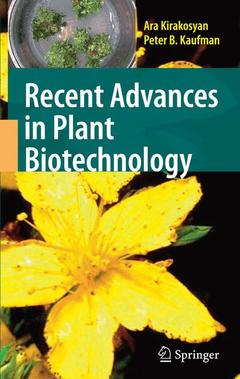Recent Advances in Plant Biotechnology, Softcover reprint of the original 1st ed. 2009
Auteurs : Kirakosyan Ara, Kaufman Peter B.

Ara Kirakosyan, Ph.D., D.Sc. is Associate Professor of Biology at Yerevan State University, Armenia and is currently Research Investigator at the University of Michigan Medical School and University of Michigan Integrative Medicine Program (MIM). He received a Ph.D. in Molecular Biology in 1993 and Doctor of Science degree in Biochemistry and Biotechnology in 2007, both from Yerevan State University, Armenia. Dr. Kirakosyan’s research on natural products of medicinal value in plants focuses on the molecular mechanism of secondary metabolite biosynthesis in selected medicinal plant models. His primary research interests focus on the uses of plant cell biotechnology to produce enhanced levels of medicinally important, value-added secondary metabolites in intact plants and plant cell cultures. These studies involve metabolic engineering coupled with integration of functional genomics, metabolomics, transcriptomics, and large-scale biochemistry. He carried out postdoctoral research in the Department of Pharmacognosy at Gifu Pharmaceutical University, Gifu, Japan under the supervision of Prof. Kenichiro Inoue. The primary research topic was molecular biology of biosynthesis of several secondary metabolites in plants; particularly this was applied to the sweet triterpene, glycyrrhizin in cell cultures of Glycyrrhiza glabra and dianthrones in Hypericum perforatum. In addition, he took part in several visiting research investigator positions in Germany. First, he was visiting scientist under collaborative grant project DLR, in Heinrich-Heine-University, Düsseldorf (project leader Prof. Dr. W.A. Alfermann). The research here concerned a lignan anticancer project, i.e., the production of cytotoxic lignans from Linum (flax). The second involved a carbohydrate-engineering project as a DAAD Fellow in the Institute of Plant Genetics and Crop Plant Research (IPK) Gatersleben, under supervision of Prof. Dr. Uwe Sonnewald. His collaboration with US scientists started with theUSD
Date de parution : 08-2016
Ouvrage de 405 p.
15.5x23.5 cm
Date de parution : 07-2009
Ouvrage de 405 p.
15.5x23.5 cm



